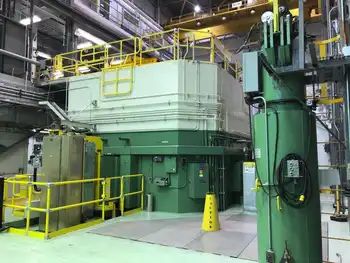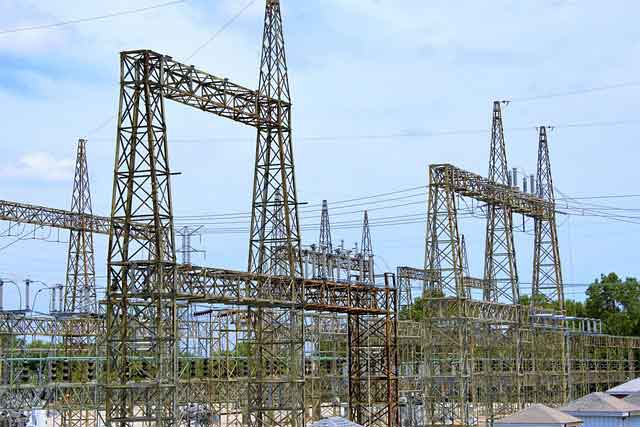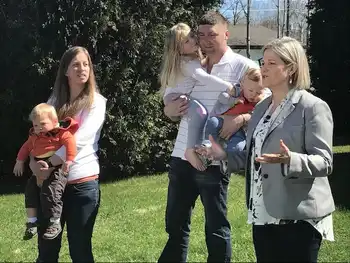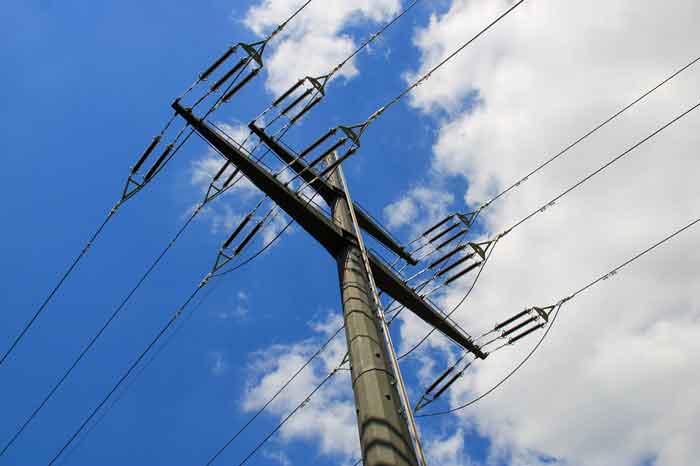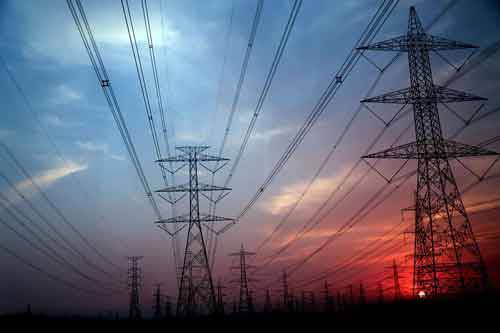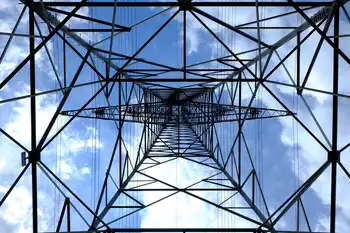Stirring GE's Ecomagination
By CNET News.com
Substation Relay Protection Training
Our customized live online or in‑person group training can be delivered to your staff at your location.

- Live Online
- 12 hours Instructor-led
- Group Training Available
To the public, the Ecomagination advertising and marketing campaign seems to have put a different face on GE - a conglomerate that makes everything from lightbulbs to TV shows.
But while GE's happy to tout its green credentials, its vice president of Ecomagination, Lorraine Bolsinger, is wary of "greenwashing."
Putting an eco-friendly spin on products to improve a corporate image without the goods to back it up will ultimately set the company - and its financial goals - back, according to Bolsinger, who says she welcomes feedback from environmental activists.
GE Chief Executive Jeffrey Immelt tapped Bolsinger two years ago to lead GE's efforts to capitalize on global environmental problems, from climate change to fresh-water shortages. That responsibility also includes reducing greenhouse gas emissions at GE, which is a member of the U.S. Climate Action Partnership, a collection of industrial businesses lobbying for climate change regulations.
During a tour of GE's labs recently in Niskayuna, N.Y., Bolsinger spoke to CNET News.com about the birth of the Ecomagination "growth strategy," clean technologies on the drawing board, and the tension of going green in Corporate America.
Question: GE was one of the first U.S.-based companies to make a bet and say there was money to be made in cleaner technologies. What was behind the initial push?
Bolsinger: When you look at our company, it's pretty easy to understand why we would have been in the space so early on. You might say we are really smart, we're really progressive, and I'd like to think that. It's also because of the very nature of things that we make. Everything that we make, just about, uses electricity or produces electricity or some kind of energy, some kind of motive power.
Question: You're big in energy.
Bolsinger: We're big in energy, and we invest in energy, so it sort of touches everything that we do. We looked at some trends. (CEO) Jeff Immelt does something called a growth playbook every year with each of his businesses. Think of it as a strategic plan for the next three to five years and beyond.
What he heard over and over were three themes for businesses. One, we are going to see enormous (gross domestic product) growth around the world. Two, we will see a scarcity of resources - scarcity of water, scarcity of (energy) resources, and higher prices that go along with that. And the security of supply is at best questionable and, of course, we see that. And the third theme is that we're going to be living in a world where regulations are going to become more and more stringent, not just in the United States but around the world.
At some point in time, customers are going to say, "I don't want anything but an environmentally friendly product." It won't be acceptable to have something that is cheap but dirty.
So we are at a point in time when we have a group of (energy) technologies in our portfolio, and we have to respond to this. We can either wait to see what happens, or we can get out in front of it. Obviously, Immelt decided to get out in front of it, and so we launched Ecomagination.
Ecomagination is for us, above everything else, a growth strategy. It is a business strategy based on the idea that by investing in technologies to help customers solve these big megatrends that we're seeing, to help them grow sustainably in this world - where there is more regulation, more scarcity, higher energy costs - that we can grow sustainably as well. So what's good for business is good for the environment, and what's good for the environment can be good for business.
Question: Reducing your company's own greenhouse gas emissions is also part of the initiative. Why is that?
Bolsinger: That's a very important piece of this because you don't have a lot of credibility if you're out there, telling everyone else, "You ought to do it, but it's not for us." Is a very important backbone of what we do.
Question: You said you're set to top the $20 billion mark in Ecomagination revenue. Yet it's not a separate division, and you're such a diversified company. How do you count it? Is a cleaner gas turbine part of Ecomagination?
Bolsinger: Yes. In order for something to be an Ecomagination-certified product, it has to have two characteristics - not one or the other, but both. It has to be significantly and measurably better in operating performance as well as environmental performance.
If we got this great green technology, but it's totally unaffordable, we say no, that's not ready to be an ecoproduct. It has to be better, in terms of operating performance for the customer - to give them some economic return - as well as the environmental piece of it. And we use a third party to help in the certification process.
Question: Why do you work with a third party to certify what you're doing?
Bolsinger: We want our claims to be authentic and certifiable. Otherwise, you're a greenwasher. We like tough standards, and I think that one of the marks of whether a process is good or not is whether everything squeaks through. And frankly, not everything does.
I'm glad that not everything makes it through because I think we have to be stringent about this. I find that the environmental-activist community is very unforgiving - that's probably a good thing. I'm sure you know about all the news reports about greenwashing and nonverifiable claims about (carbon) offsets and carbon neutrality. I think we have to be ever-vigilant to never cross that line because it's a long way back.
Question: So if half of your product portfolio is already greener, will it all be, at some point?
Bolsinger: You know, someday, I think we'll stop counting. Don't ask when that is. Maybe when I leave this job, that'll be the day, but we continue to count because we want to be on the record, we want to make sure that we are making progress.
But I do believe that at some point in time, customers are going to say, "I don't want anything but an environmentally friendly product." It won't be acceptable to have something that is cheap but dirty. Do I think that eventually everything is going to be an ecoproduct? I do, at least from the equipment perspective.
Question: How far off is that day?
Bolsinger: I'd say certainly 10 years from now, probably sooner - probably closer to 5.
Question: We're here at your research labs. How do see technology addressing climate change?
Bolsinger: I'd say that when you look at where the world needs to be - let's say we really have to have 80 percent lower (greenhouse gas) emissions by the middle of the century, right? That's the "walking around" numbers that the scientists say.
Eighty percent is huge. So I say in the next 5 to 10 years, we're going to focus on component efficiencies. Making everything more efficient by an order of magnitude, so you might say the GE (aircraft) engine is 15 percent more efficient--that's a good one. The Evolution locomotive with 40 percent lower nitrogen oxide emissions. More efficient lighting. (The list goes on.)
All those component things are doable. I think that the next generation of technologies - say, in the next 10 to 20 years - will revolve more around systems, looking at bigger broader systems play. Because now you need to get 20, 30, 40 percent improvements. We're going to be looking at total air traffic management. Not just making the engine in the airplane a little more efficient--the whole system has to get more efficient.
And further out, it's really transformational technologies. Truly breakthroughs that we don't have on the radar screen today. Or making those breakthroughs more cost-competitive. The next-generation solar, battery technology, biofuels.
We have to work on those today if you are going to be see them 20 years from now - it takes that long to get the infrastructure in place. We're doing the research today on how to make it cost-competitive, deployable, all those things. We've got to be working on those things today if we expect it to be in any way mainstream by midcentury.
Question: How about the nonenergy parts of GE? What does Ecomagination mean to them?
Bolsinger: We have more folks wanting to create certified products than we could have imagined. It's easy to imagine the technologies that I've already talked about. The energy business already has an enormous (amount of) renewable technologies - everything from biogas turbines to gas turbines to wind and solar, integrated coal gasification. You can understand those.
The surprises for me have been the financial-services business coming to us, creating a green credit card. There's no end to this thing. I didn't think we thought about ecohomes. It just serves as a muse for how our business groups can work together - our water (purification) and energy business, for example.
Question: Has there been any skepticism at all? There are people who don't believe in global warming and climate change. Has that been a barrier at all?
Bolsinger: No, it hasn't. First of all, we took off the table the debate about climate change a long time ago.
There are fewer and fewer people who are skeptics on climate change. People who say, "I don't believe it" or "I don't see it," they kind of are outliers at this point. I think it's much more mainstream. We're past the point of debating the science.
For us, we said we're just going to take reality as it is. So whether you want to debate climate change until the cows come home doesn't matter. The world is moving in that direction. There is scarcity of resources, there is regulation coming, so let's deal with the world we have. We can keep debating. What's the point of that? The world's has moved on, and we need to keep pace with that.
I think the skepticism piece was never a big deal for me because (Ecomagination) was never based on "we're doing this for philanthropy" or "we're doing this to make the world safe." We're glad to be doing that as a result of making money. It's a different lens that informs your decisions about where to spend money and what resources you're going to invest.
Question: Has there been resistance internally? This is a big change. Has it caused conflicts?
Bolsinger: Not conflicts. I know everybody wants to tell that story that everybody was skeptical. I think the biggest concern in the very beginning was that we didn't overstate things. We didn't turn into this big green machine.
We've been around for more than 120 years. We have legacy issues. Of course we do. I think you always have to be very careful that you don't step out and try to be holier than thou. You have to do what you're good at.
So I wouldn't call it skepticism. I would call it healthy concern that we get it right. I have an eco-advisory boardÂ…. We bring in outsiders to tell us how we are doing because I think it's important.
So I wouldn't say skeptics. I'd say there is tension in the businesses - the kind of tension that you want. Tension means that there is movement. If there's no tension, then it's business as usual - you just call it Ecomagination, and you're not doing anything different.
I like the tension. The tension comes when we introduce the GE Money (business) to the energy financial-services (business), and we say, "You ought to buy their offsets." And we get these two businesses to work together.
Does it cause tension? Yeah, but look at the result.
I'd say if the only other place that we have concern - and we always have concern - is whether customers embrace it. We have to be careful that the customers don't feel that we are so far out in front of them that they can't keep up.





